Bishop: 30 years of making the world a better place when disaster struck
It never ceases to amaze me how in a community of 30, 000 people Gibraltar has over the years produced talent to equal that of people in the world-wide world in all areas. In the field of medicine, in science, in the legal profession, in theatre, in the arts world with internationally acclaimed artists like Christian Hook, and in the world of music headed of course by singer songwriter Albert Hammond. There is a long list, and I could add other names but both Christian and Albert have featured many times on these pages.
Today I bring to Alice’s Table a man who has travelled the globe to help save lives technological and natural disasters. A man who is equal to any consultant in his field of work developing a global reputation in his field. I have been wanting to sit him at our table for a while now – he has visited and knows a good many countries to great detail especially in their emergency responses, and if they are prepared for any disaster or major emergencies. I am talking about Joe Bishop – who has often featured on these pages informing on numerous incidents around the world. Us journalists - for a long time - followed wherever he went. He has often featured on these pages talking about his experiences.
Joe is an Emergency and Crisis Management Consultant who has advised global institutions, the United Nations, the European Commission Civil Protection Mechanism, and many governments in the world on emergency management and disaster response strategies. He has been consulted and led many teams to help coordinate and ease the situation in a quick response environment to help others.
Joe has participated in some 26 international response missions, assisting countries affected by natural disasters such as earthquakes, floods, environmental emergencies and terrorist attacks to mention but a few. The list of his involvement in international emergency/disaster management experience is impressive – and long. Here are just a few examples with the 1985 earthquake in Mexico City, and the 1986 earthquake in San Salvador, amongst the first whilst still based in London. Then came the 1992 earthquake in Cairo, and in 1993 in India.
1994 would bring the complex emergency in Rwanda’s genocide in 1994 and floods in China. In 1997 the environmental emergency in Indonesia, and a year later the terrorist attack in the US Embassy in Nairobi in Kenya in 1998.
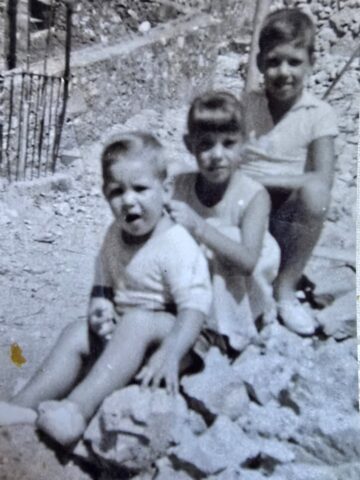
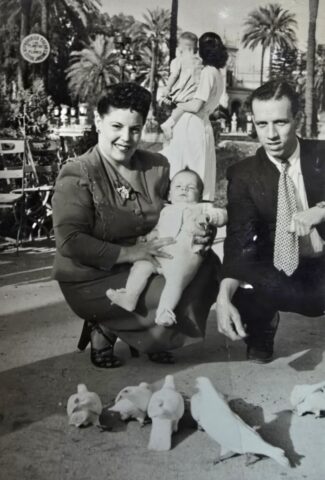
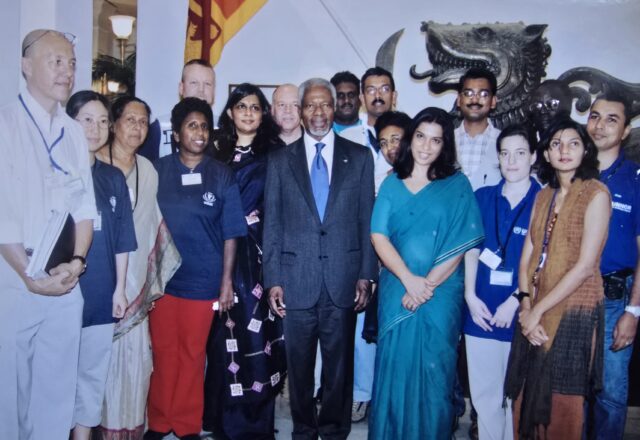
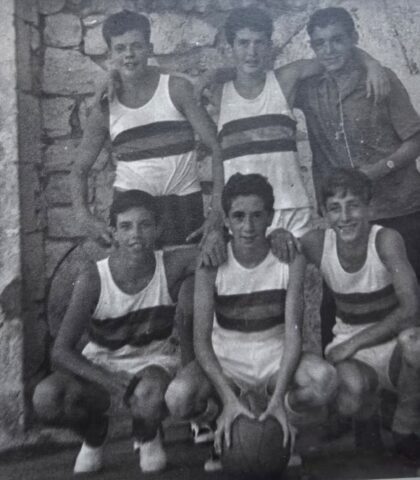
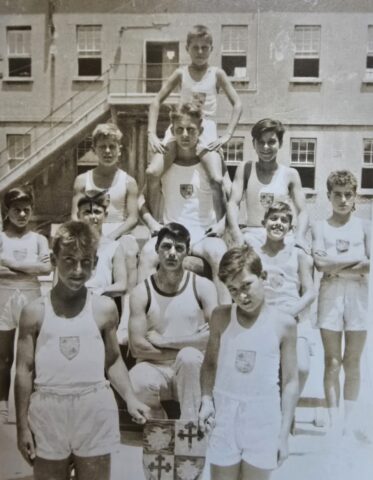
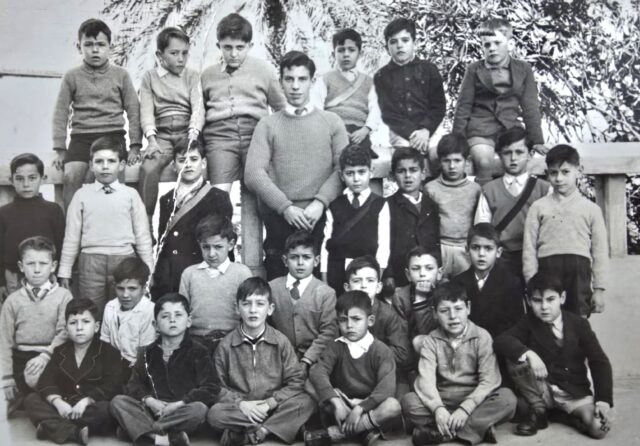
As we entered the Millenium, Joe again consulted in the 2000 cyanide Environmental Emergency in Romania which polluted river waters in the Tisza River and then the Danube affecting Hungary and Serbia (considered the worst environmental disaster in Europe since Chernobyl), and in the 2001 Earthquake in El Salvador, and that same year the Afghanistan Crisis in Central Asia. In 2003 the earthquake in Eastern Turkey. In 2004 he was in the Dominican Republic – when Tropical Storm ‘Jeanne’ hit the area, and in the 2004/5 South Asia Tsunami Disaster in Sri Lanka. Remember the 2005 Guatemala mudslides – he was there. Also, in the 2007 Earthquake in Ica in Peru, and the following year in Ecuador in the floods in the Guayas Province, and in
2017 in the Chile Forest Fire.
But his life begins here in Gibraltar in 1949– born into a working-class family at the very top of Lopez Ramp – La Escalera del Monte - in the days when front doors remained open and were never locked.
“People lived closely in a happy ‘ambient’ where neighbours always helped each other out. It was a humble upbringing in an old patio set-up where we all lived well. Just behind where we lived, we had at our disposal the whole of the upper rock where we played freely. In the area we also had the chicken runs that people kept then. It really was a typical Gibraltarian way of life in the 1950s.”
Joe was the eldest of four children: Magnolia, Ernest and Priscilla.
“I remember the verbenas held in the patios, and the weekly bingo sessions where all the neighbours would play. I remember that on the heavy ‘levante’ days water events were held in the patios as we all had saltwater taps in the home. Or we went to the ‘Montagu’ or we went to the cinema for sixpence to the Naval Trust Cinema matinee. I also remember picnics in the Almoraima in Spain. As a child, the furthest I had ever gone was to Cadiz as my grandfather had relatives who worked in the salt flats. But such trips became less and less as the situation with Spain got worse leading to the closure of the frontier in 1969.”
From the ages of 11 to 15 Joe became a 1st/4th Scout member and recalls how much he enjoyed the weeklong summer camps held at “La Finca de Imossi” to the left on the hill leading up to San Roque which was always so much fun and which ended around 1961 and 1962.
“I can remember some Guardia Civil joining us around the campfire by the river and drinking hot chocolate.
“I remember the Commonwealth Parades on the Naval Ground and the many things we did, when we helped others during Scouts’ Bob-a Job week, but most important was the learning aspect of being in the movement learning – the respect and discipline – and the fact that gave one a sense of purpose.”
The family home was a two-bedroom flat where his maternal grandparents also lived.
“I slept in a collapsible bed at the foot of my grandparent’s bed – Antonio and Antonia. My mother Nina (Carolina) and my father Ted had the adjacent bedroom with the two girls. In the middle of the night if we needed the toilet, we all had to go through my parents’ bedroom, into the kitchen and then the toilet, we considered ourselves lucky to have an inside toilet in those days. We had very little, but we were very happy there and I only have the best of memories.”
His grandfather was a retired mechanic from the Dockyard “a manitas”
who could make and repair anything he put his mind to, my brother Ernest, a retired firefighter takes after him.
“He was really gifted with his hands and at one time converted my mother’s sewing machine into a lathe with a blade to build a complete set of collapsible wooden beach chairs, table and tent for the beach.
My grandmother was very articulated and bright and could write well in Spanish. I remember neighbours asking her to write letters for them.
My father Ted was a leading fireman in the Gibraltar Fire Brigade moving up the ranks to Deputy Chief Officer many years later. I remember him being very strict with us boys especially.”
Young Joe began his school days at St Mary’s school – “I was not very academic as a boy” he tells me as he repeats the story we have so often read on these pages. Then 11 Plus came along – and depending on how you did you either moved on to the Gibraltar Technical College or the Grammar School. The only other option was the Dockyard.
Having failed the exam – he did not want to face his parents, and his uncle Ernest found him crying on the steps of Library Ramp… and he helped him face the day. Joe became a student at St. Jago’s, and pays tribute to his teachers at the time describing them as people with great values and who gave a lot to teaching and their pupils. By the age of 15 he was taking his entrance exam to enter the Dockyard apprentice scheme. He became an electrical fitter – “this was to change my life,” he says.
“We worked at the Dockyard from 7.30am to 5pm, and then one day and evening a week we attended the Gibraltar Technical College. Many of the teaching staff were Royal Naval Officers and they treated you like grown up men, their teaching methodology and transfer of know-how and do-how was remarkable. There was so much you could learn if you wanted to.
“It was then I did my City and Guilds and GCE’s exams having left school with not a qualification to my name. Into my final year before completing my five-year apprenticeship things changed and I was offered a permanent job in the Drawing Office but perhaps influenced by his father, even then, he wanted to be a fireman.
In 1969, at 19 years of age, he was ready to join the Fire Service – The Gibraltar City Fire Brigade – another move that would redefine my future” he adds.
It was then, as a young man, that he would train in the core disciplines of firefighting and the comradeship so common in the fire service.
“Once again discipline and responsibility in this field was paramount.
There were many good professional people to learn from as role models, and who I respected, like the Chief Fire Officer Keith Hoare at the time.”
This was a familiar environment to him and whereas a boy growing up in Gibraltar he would have often visited his father taking him ‘el costo’
his lunch and dinner when he was on duty at the station.
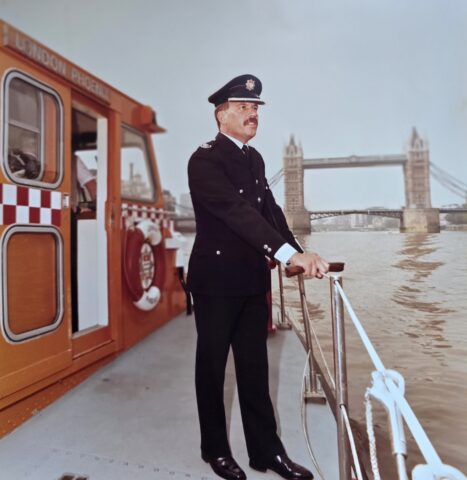
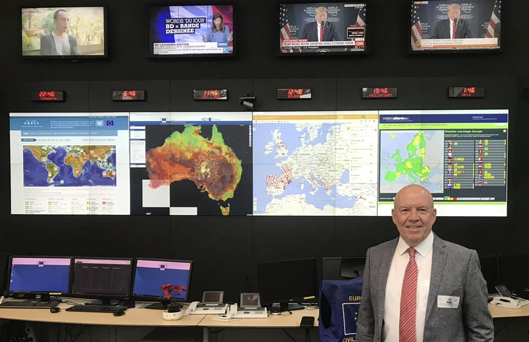
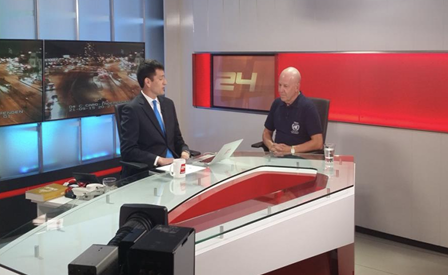
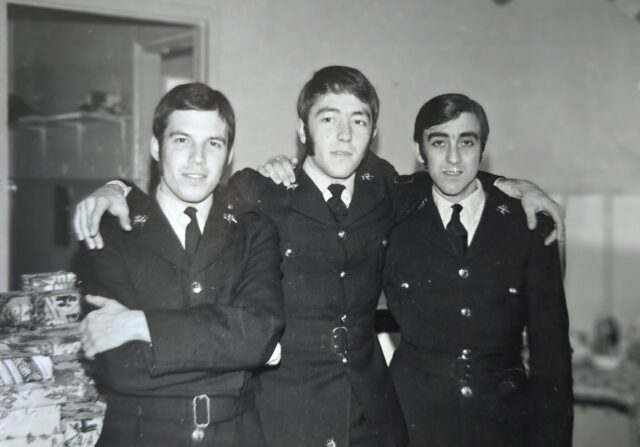
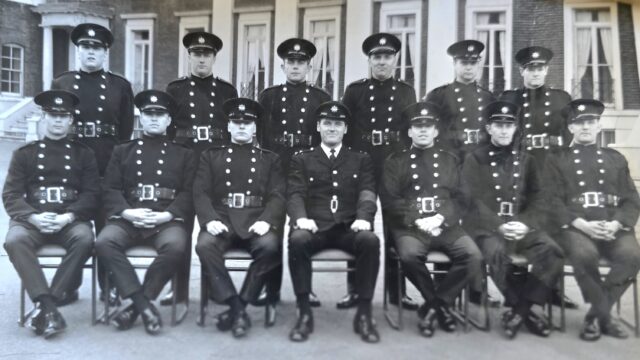
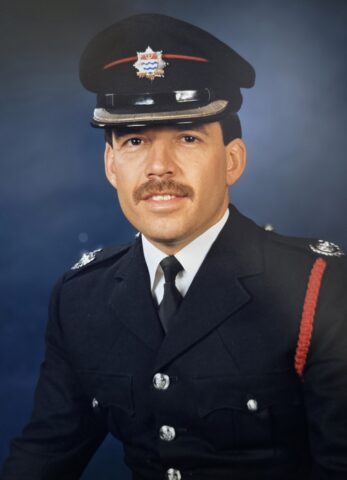
On completing his training, and working for the Brigade the young fireman, who at the time was doing a degree in Fire Engineering, decided he wanted to move on to obtain the necessary operational experience in a large metropolitan brigade. He left for London to join the London Fire Brigade.
“I wanted the track record, experience and expertise that London could offer me – the career development and exposure to a wide range of incidents.”
Having never been to England, the Chief Fire Officer Keith Hoare, was prepared to hold his job whilst he experienced London in case he decided to return to Gibraltar. By then he was ready to marry his girlfriend, Belinda, a local girl, who had lived most of her young life in England and was settling in Gibraltar.
The couple married in 1971 and immediately left for London. It must be remembered that housing locally was a major problem then – most young couples lived with their parents or in-laws. But the young man was determined to give London a shot. The couple eventually had two daughters Carinthia and Denielle and later on Natasha and Jeanette all born in the UK.
On arrival, whilst living in Lewisham “with little money in our pocket, this was our honeymoon” Joe eventually found a job as a Draughtsman. At the same time, he applied to join the Fire Brigade in Kent, London and Manchester – London being his preferred option. He persevered and eventually got in although initially he had not been successful although he passed all the entry tests – written and practical with flying colours. But years later as a Senior Officer he gained access to his Personal Record Files and learned he had been originally rejected in the first round because of his strong native accent.
But Joe had arrived and was determined to succeed. He rose through the ranks working as a Firefighter with the London Fire Brigade for 19 years from 1971 to 1990.
He trained at Southwark Training School close to London Bridge. As part of the Brigade in the early years he was based as a fireman
(firefighter) at the Brigade’s Headquarter Station at Lambeth. After five years he would move around the London area holding various posts from Firefighter to Senior Officer in the rank of Divisional Officer (Grade I). For two years and following a strict national selection process he became an instructor in the National Fire Academy, at Moreton-in-Marsh, he was Staff Officer to the Chief Officer and Chief
Executive: Deputy Commander for Emergency Planning: Commandant of the Brigade Training School and held other senior appointments.
Joe did get his time in London as Divisional Officer.
But at age forty he failed his medical examination as the result of a fireground injury he suffered as an Assistant Divisional Officer back in 1983, placing him unfit for operational duties. By then he was already well known in international Urban Search and Rescue (USAR) organisations having led London Fire Brigade’s USAR team to earthquakes in Mexico, San Salvador and Armeni (former USSR) this is where life offered him a second chance.
Throughout this time, he was building contacts in the disaster and emergency management world, and in search and rescue, this would really help me move forward” he again tells me.
At the time and in the aftermath of the Spitak Earthquake, Joe was invited to a conference in Washington DC, USA where he spoke about how and where he saw emergency response developing into the future
A senior member of the United Nations Disaster Response Office (now the Office for the Coordination of Humanitarian Affairs -OCHA) was present at this talk, and approaching him offered him the opportunity to write an article in the United Nations magazine on his presentation to further expand how he saw the future in this field – and he did – and the rest as they say is history.
Also, when Joe was due to retire, he was called on to host a delegation of Senior Officers from the Madrid Community Fire and Rescue Service visiting the London Fire Brigade– the boss wanted to transform his fire service training in the Madrid Community and soon offered him a three-year consultancy to oversee the project.
“I took my chances, left the London Brigade and set up a consultancy in Madrid. Not long after the United Nations contracted me as a consultant in emergency and disaster response – and all this led to the once young firefighter from Gibraltar becoming an internationally recognised emergency response consultant. There was no doubt his time in the Gibraltar Fire Brigade had laid the foundation for his later global disaster relief work.
Today, he has been involved in international emergencies and disasters consultancy spanning 35 years – Joe was 40 when he left the London Fire Brigade. Around the world he has trained, led and given courses, directed emergencies and disasters coordination operations, conducted emergency response After Action Reviews, set up projects and structures and has been called upon to give keynote speeches at conferences in every aspect of emergencies and disaster response.
Since 1990 he has been working as an Emergency and Crisis Management Consultant – and has undertaken consultancies in various capacities, for many world agencies, institutions and companies.
As I point to his thoughts on climate change, he quickly tells me he is not a climate change expert but acknowledges it is more and more in the equation, as the UN had classified Conflict; Pandemics and Climate Change as the three biggest threats for the future.
“He adds, “you cannot divorce climate change from climate disasters as recent floods and forest fires have shown.”
Joe consistently promotes better public education on emergency procedures in every country in the world. He strongly believes in community-level preparedness, infrastructure resilience, and transparent communication during a crisis.
Over the years his work has involved remote monitoring, team coordination, and advising on logistics and communication strategies.
Today in semi-retirement he remains an advisor to the UN Office for the Coordination of Humanitarian Affairs and consultant to the European Union Civil Protection Mechanism.
He tells me that although disasters cannot be avoided one can be prepared by the introduction robust and sustainable Emergencies and Disaster response systems – “it is only through building resilient communities through community engagement and training that we can mitigate the impact and early recovery in major emergencies and disasters, that is always my advice.”
He has been called on to advise on flood relief, tsunami recovery, and post-conflict humanitarian coordination in various countries. His work no longer incorporates field deployments, but more remote advisory roles, and policy-level consultations.
As he looks back on his life, he admits he has been very fortunate having found personal satisfaction in all he has done.
The reward, he says, is in knowing that “through our work we have done our bit to get people back to where they were before disaster struck - and I have been a part of that and given them hope to rebuild their lives and build more resilient communities and better equipped emergency and disaster response experts.”
In many ways, although he humbly plays it down, he has helped to make the place a better place for many people living in disaster areas for
30 years.
“I am a team player – and if I could, I would do it all over again.”
The boy who failed his 11 Plus, could never - in his wildest dreams – have imagined the journey he was to embark on when left Gibraltar for the greater world.
“I saw a train loaded with opportunities and I jumped on it and never looked back,” he says. And that’s the way to do it…









